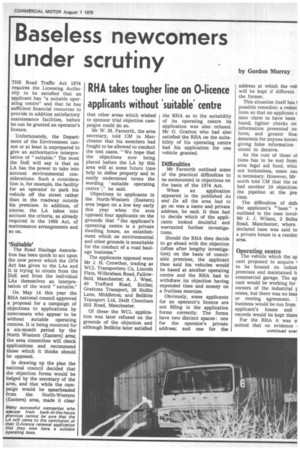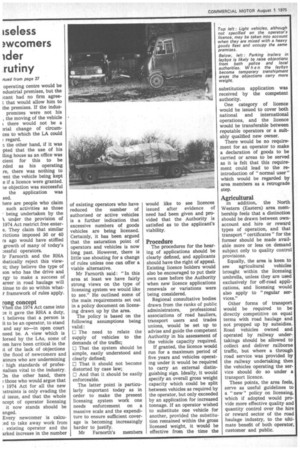Baseless newcomers under scrutiny
Page 39

Page 40

If you've noticed an error in this article please click here to report it so we can fix it.
RHA takes tougher line on 0-licence
applicants without suitable centre
by Gordon Murray
THE Road Traffic Act 1974 requires the Licensing Authority to be satisfied that an applicant has "a suitable operating centre" and that he has sufficient financial resources to provide in addition satisfactory maintenance facilities, before he can be granted an operator's licence.
Unfortunately, the Department of the Environment cannot or at least is unprepared to give an authoritative interpretation of "suitable." The most the DoE will say is that an LA has the power to take into account environmental considerations. Such a consideration is, for example, the facility for an operator to park his vehicle off the street rather than in the roadway outside his premises. In addition, of course, the LA takes into account the criteria, as already required in the 1968 Act, of maintenance arrangements and so on.
'Suitable'
The Road Haulage Association has been quick to act upon the new power which the 1974 Act has given to the LAs and it is trying to obtain from the DoE and from the individual LAs themselves an interpretation of the word "suitable."
On May 14 this year the RHA national council approved a proposal for a campaign of objections to applications by newcomers who appear to be without suitable operating centres. It is being mounted for a six-month period by the North Western (Eastern) area; the area committee will check applications and recommend those which it thinks should be opposed.
In drawing up the plan the national council decided that the objection forms would be lodged by the secretary of the area, and that while the campaign would be spearheaded from the North-Western (Eastern) area, made it clear that other areas which wished to sponsor trial objection campaigns could do so.
Mr W. M. Farnorth, the area secretary, told CM in Manchester that his members had fought to be allowed to conduct the test cases. "We hope that the objections now being placed before the LA by this area will at some future time help to define properly and in easily understood terms the wording 'suitable operating centre '," he said.
Objections to applicants in the North-Western (Eastern) area began on a law key early this year when the area opposed four applicants on the grounds that "the applicant's operating centre is a private dwelling house, an establishment which on environmental and other grounds is unsuitable for the conduct of a road haulage business."
The applicants opposed were Mr J. H. Crowther, trading as WCL Transporters Co, Lincoln Flats, Wilbraham Road, Fallowfield, Manchester; A. J. West, 49 Trafford Road, Eccles; Grattons Transport, 38 Hollin Lane, Middleton; and Bellkite Transport Ltd, 24413 Cheetham Hill Road, Manchester.
Of these the WCL application was later refused on the grounds of the objection and although Bellkite later satisfied the RHA as to the suitability of its operating centre its application was also refused. Mr 0. Gratton who had also satisfied the RHA on the suitability of his operating centre had his application for one vehicle granted.
Difficulties
Mr Farnorth outlined some of the practical difficulties to be surmounted in objections on the basis of the 1974 Act.
When an application appeared in the published As and Ds all the area had to go on was a name and private address, he said. It then had to decide which of the applicants looked doubtful and warranted further investigations.
Should the RHA then decide to go ahead with the objection (often after lengthy investigation) on the basis of unsuitable premises, the applicant then said his vehicles would be based at another operating centre and the RHA had to withdraw its objection having expended time and money on a fruitless exercise.
Obviously, some applicants for an operator's licence are not filling in the application forms correctly. The forms have two distinct spaces : one for the operator's private address; and one for the address at which the veil will be kept if different the former.
This situation itself has possible remedies: a redesi form so that no applicant c later claim to have been fused; tighter checks on information presented on form; and greater final deterents for anyone knowi giving false information intent to deceive.
As the cost of these ol tions has to be met from area legal aid fund, whic not bottomless, some cau is necessary. However, Mr north told CM that the ce had another 10 objection: the pipeline at the pre time.
The difficulties of deth the applicant's abase" v outlined in the case invoh Mr J. 3. Wilson, 2 Belha Road, Manchester, where declared base was said to a private house in a resider area.
Operating centre
The vehicle which the ap cant proposed to acquire to be housed on indust premises and maintained b commercial garage. The ap cant would be working for owners of the industrial f mises, but there was no leas or renting agreement. e1 business would be run from applicant's house and records would be kept there For the RHA it was si mitted that on evidence operating centre would be ndustrial premises, but the :cant had no firm agreet that would allow him to the premises. If the induspremises were not his , the moving of the vehicle there would not be a p:rial change of circumces to which the LA could regard.
the other hand, if it was pted that the use of his lling house as an office was cient for this to be rded as his operating re, there was nothing to 'ent the vehicle being kept e if a licence were granted. le objection was successful the application was sed.
here are people who claim such activities as those being undertaken by the k under the provision of 1974 Act restrict free entere. They claim that similar rictions imposed 30 or 40 rs ago would have stiffied growth of many of today's 2essful operators.
Ir Farnorth and the RHA ihatically reject this viewIt; they believe the type of on who has the drive and rgy to make a success of areer in road haulage will tinue to do so within whatr framework of rules apply.
rong concept
Vhen the 1974 Act came into ;:e it gave the RHA a duty, t believes that a person is it to be an operator, to stand and say so—in open court need be. A view which is lorsed by the LAs, some of am have been critical in the ;t of the lack of objections the flood of newcomers and ateurs who are undermining : high standards of profesnalism vital to the industry. Dri the other hand, there those who would argue that 1974 Act for all the new istraints is only evading the d issue, and that the whole acept of operator licensing it now stands should be anged.
Every newcomer is calcu:ed to take away work from . existing operator and the irked increase in the number of existing operators who have reduced the number of authorised or active vehicles is a further indication that excessive numbers of goods vehicles are being licensed. Certainly, it has been argued that the saturation point of operators and vehicles is now long past. However, there is little use shouting for a change of rules unless one can offer a viable alternative.
Mr Farnorth said: "In this area at least we have fairly strong views on the type of licensing system we would like to see." He outlined some of the main requirements set out in a policy document on licensing drawn up by the area.
The policy is based on the following assumptions being valid: • E The need to relate the supply of vehicles to the demands of the traffic; C] That the system should be simple, easily understood and clearly defined; CI That it should not become distorted by case law; 0 And that it should be easily enforceable.
The latter point is particularly important today as in order to make the present licensing system work one needs enforcement on a massive scale and the expenditure to ensure sufficient coverage is becoming increasingly harder to justify.
Mr Farnorth's members would like to see licences issued after evidence of need had been given and provided that the Authority is satisfied as to the applicant's viability.
Procedure
The procedures for the hearing of applications should be clearly defined, and applicants should have the right of appeal. Existing licence holders would also be encouraged to put their own case before the Authority when new licence applications renewals or variations were being considered.
Regional consultative bodies drawn from the ranks of public administrators, professional associations of road hauliers, transport users and trades unions, would be set up to advise and guide the competent Authority in his assessment of the vehicle capacity required.
If granted, the licence would run for a maximum period of five years and vehicles operating under it would be required to carry an external distinguishing sign. Ideally, it would specify an overall gross weight capacity which could be split between vehicles as required by the operator, but only exceeded by an application for increased tonnage. If an operator wished to substitute one vehicle for another, provided the substitution remained within the gross licensed weight, it would be effective from the time the substitution application was received by the competent authority.
One category of licence would be issued to cover both national and international operations, and the licence would be transferable between reputable operators or a suitably qualiffed new owner.
There would be no requirement for an operator to make a declaration of goods to be carried or areas to be served as it is felt that this requirement could lead to the reintroduction of "normal user" which would be regarded by area members as a retrograde step.
Agricultural
in addition, the North Western (Eastern) area membership feels that a distinction should be drawn between ownaccount and hire or reward types of operation, and that transport " certificates " for the former should be made available more or less on demand subject only to quality control provisions.
Equally, the area is keen to see agricultural vehicles brought within the licensing umbrella, unless they are used exclusively for off-road applications, and licensing would also apply to "regular services."
Other forms of transport would be required to be directly competitive on equal terms with road haulage and not propped up by subsidies. Road vehicles owned and operated by railway undertakings should be allowed to collect and deliver railborne traffic, but where a through road service was provided by the railway undertaking then the vehicles operating the service should do so under a transport licence.
These points, the area feels, serve as useful guidelines to. a " new " policy on licensing, which if adopted would provide more effective quality and quantity control over the hire or reward sector of the road haulage industry, to the ultimate benefit of both operator, customer and public.




















































































